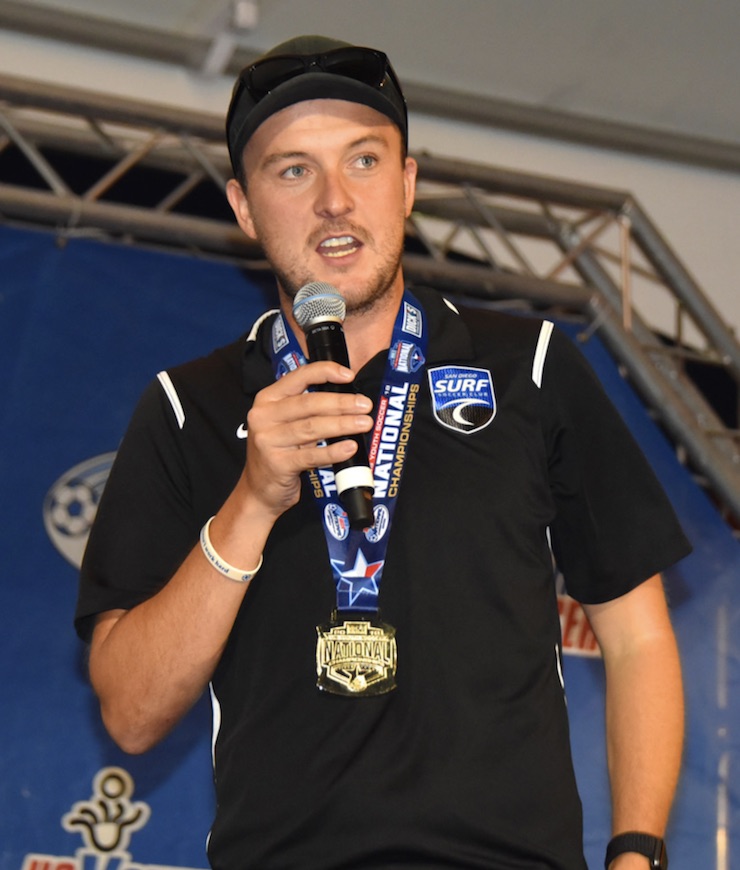Finding the Right Club for Your Child During Tryouts
Advice on finding the Right Youth Soccer Environment
Today’s youth soccer players are the fans of tomorrow. The youth soccer experience is a great gift of childhood, but competitive youth soccer tryouts can be stressful. Here is great advice for soccer parents from a top youth soccer coach.
Youth Soccer News: Youth Soccer Craig Barclay is the Zone One Director of Coaching – Girls at San Diego Surf Soccer Club and is dedicated to creating a positive learning environment for kids to discover the joys of playing soccer.
Growing up in England, Barclay has a lifelong passion for the beautiful game and years of experience coaching. His goal is to always inspire children to fulfill their potential and ultimately love the game.
 This year, Surf SC Girls 2005, coached by Barclay, won the California Regional League, and U.S. Youth Soccer Far West Regionals in Hawaii, before, traveling to the U.S. Youth Soccer National Championship in Texas. Barclay’s team returned home National Champions. This was the 11th National Championship title earned by Surf SC teams and is an amazing recognition of the club’s successful focus on player development.
This year, Surf SC Girls 2005, coached by Barclay, won the California Regional League, and U.S. Youth Soccer Far West Regionals in Hawaii, before, traveling to the U.S. Youth Soccer National Championship in Texas. Barclay’s team returned home National Champions. This was the 11th National Championship title earned by Surf SC teams and is an amazing recognition of the club’s successful focus on player development.
The coach of the Girls 2005 Academy Select, Girls 2006 Academy Select, and Girs 2007 Academy Select teams at Surf SC, Barclay has a well-earned reputation for excellence. Focused on making player development fun, Barclay’s players thrive on working together as a team while respecting the individual.
Barclay understands the important role soccer parents play and that successful player development is a true partnership between coach, player, and family. Always recognizing the contributions in time and money that parents make, Barclay was happy to share his insights to help soccer moms and dads.

SoccerToday Interview with Surf SC’s Craig Barclay on Tryouts
Diane Scavuzzo: Tryouts are stressful for everyone — the young players going off to be judged and the parents, eagerly and nervously waiting. What can parents do to help their young soccer player?
What is the most important piece of advice you would like to share with soccer parents?
Craig Barclay: My biggest advice to parents when looking to join a new club is to remember that your child is the most important person in this process.
Maintaining your child’s love and passion for the sport is paramount — It is the most important quality any young player can possess.
Finding the right environment which will continue to nurture their love for the game is important. Therefore, when looking for the right environment and club, do your research.
Just like looking for your child’s next school, ask questions and take your time when choosing a club and coach for your child. Regardless of how much, or how little you know about soccer and youth development, you can never do enough research into placing your child into an environment that is best suited for them.

Diane Scavuzzo: What is your advice for finding the right youth soccer club?
Craig Barclay: I see a lot of players and parents who pick a club based upon the coach. But what happens when that coach moves on? It’s important that you pick a club, that regardless of the coach, has a development process and plan for your player that is consistent from U8 through to U18.
A lot of clubs do have great mission statements, philosophies and curriculums on paper, but the proof is in the pudding on game day!
Game day is a true indication of all the work that goes on behind the scenes in practice. It’s important that at the younger ages we don’t get too consumed with results. Instead, when viewing a club, focus on what the club is trying to develop within their players.
At Surf, we place a big importance on developing technically efficient and comfortable players from a very young age and place an importance on mastering different 1v1 situations.
This should be evident when watching our teams play, our players should look relaxed and calm in possession and be able to play under pressure in different situations. Whatever the club’s beliefs are, get yourself out to different coaches and different teams within the club and see the club philosophy in action first hand.
Parents should go and watch a few training sessions and or games to see the club’s philosophy in action first hand.

Diane Scavuzzo: What are a few good questions to ask a club?
Craig Barclay: Parents should always ask questions but avoid asking questions about the team, instead focus on your daughter… for example, “What does that club offer your child in terms of individual development?”
Soccer is a team-first game and that should always be the first priority, however, there should always be a focus on developing the individual player.
What does that club have in place for different individual development levels?
A good youth soccer club should offer each player an individual development program and monitor the progress throughout the year.
Depending on how well developed your player is technically, tactically, physically, or psychologically, a strong development-oriented club will offer different training environments to help push or nurture these areas alongside their regular team training. That is what Surf SC does.
Diane Scavuzzo: What is the biggest mistake parents often make?
Craig Barclay: I wouldn’t necessarily say it’s a mistake, but there’s a big misconception, especially at the younger ages, that playing at the highest level or on the best team will be the best development for your player.
Sometimes this can be detrimental to your child.
I’m a massive believer that players should experience a balance of challenge and success within their team.
- Too much success and the player won’t be pushed or tested within their development.
- Too much challenge and the player won’t experience enough success and lose confidence.
If you’ve done your research and trust the club, trust that the coaches will place your child in an environment that is suitable for their personal development and that they will have room to grow as a player.
Diane Scavuzzo: Any other recommendations?
Craig Barclay: Change and difference experience play a big part in youth development. Placing your child into different training environments or with different coaches may be positive for your child’s social and soccer development.
Make sure your club allows the freedom to experience new settings and environments and that your child feels the freedom to explore their own development options without any pressure or reputations from their coach or club.
Finally, remember that building a positive experience for your child is the most important thing in order to nurture and build upon their passion and love for the sport.
During tryouts, coaches, clubs and parents often forget about this and put themselves before the young player.

As a club, it’s important that we understand that Surf isn’t for everyone.
It is important though that regardless of the badge, as coaches, we make the player feel comfortable and positive with any change that they may experience during this time.





